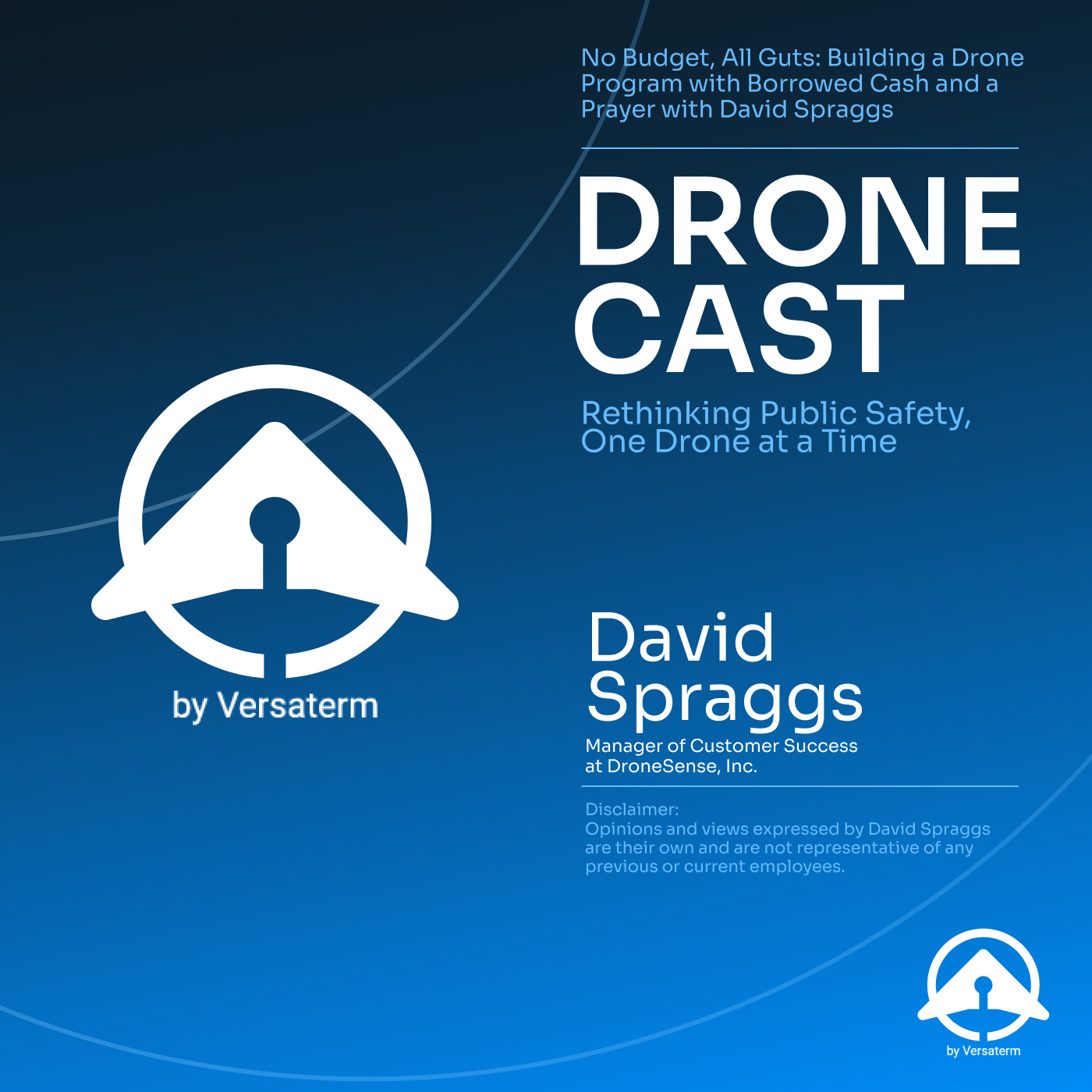No Budget, All Guts: Building a Drone Program with Borrowed Cash and a Prayer with David Spraggs
- Author
- DroneSense
- Published
- Tue 02 Sep 2025
- Episode Link
- https://podcasts.fame.so/e/2nxzp9rn-david-spraggs-part1
In this episode of DroneCast, host Joe Kearns speaks with David Spraggs, a veteran law enforcement officer with more than two decades at the Boulder Police Department and now Manager of Customer Success at DroneSense. David’s journey into unmanned aircraft systems (UAS) began in 2014 when he first encountered a $150,000 drone while serving as bomb squad commander. This sparked a vision that would ultimately lead him to pioneer Boulder PD’s drone program, turning drones from a niche technology into an indispensable part of public safety response.
David recounts a pivotal mission involving a suicidal subject where drone technology shifted from experimental to essential, cementing its role in critical incident response. He explains the strategies he used to secure buy-in, navigate resistance, and build transparency with the community, factors that ensured the program’s legitimacy and long-term success. His experience highlights the importance of proper documentation, accountability systems, and data-driven reporting in sustaining and scaling drone programs.
The episode also explores the evolution of drone use in public safety, from high-cost specialized platforms to accessible, versatile tools that transform hazmat response, search and rescue, and incident command. David emphasizes the need for cross-agency collaboration, knowledge sharing, and balancing innovative technology adoption with practical operational needs.
Drawing from his unique background in chemistry, forensic science, aviation, and over 20 years in law enforcement, David combines tactical expertise with technical knowledge to guide agencies in building effective, accountable, and sustainable drone programs. As a former bomb squad commander and pioneer of Boulder PD’s drone program in 2016–2017, he offers hard-earned insights into how UAS integration can reshape public safety operations. Today, as Manager of Customer Success at DroneSense, David continues to help agencies nationwide adopt and expand drone technology in meaningful, mission-driven ways.
This is Part 1 of the conversation. In the next episode, David continues his story, discussing how UAS technology has evolved, the lessons learned from program expansion, and what’s next for public safety drone integration.
What You’ll Learn:
- How early adoption of drones transformed responses to hazmat, bomb squad, and search-and-rescue incidents
- Why community trust and transparency are foundational to a sustainable police drone program
- The critical role of documentation, accountability, and data management in program success
- Strategies to overcome resistance, budget constraints, and skepticism when launching a program
- The value of cross-agency collaboration and knowledge sharing for growth and resilience
Helpful Links:
- Fill out the Audience Form here.
- Explore more episodes and insights on the official DroneCast website: https://www.dronesense.com/dronecast
- Ready to launch or enhance your drone program? Get Started with DroneSense today!
- Parrot, ANAFI UKR Tech Sheet: https://5n8jp.share.hsforms.com/2oWfNvmGLRCeKUWcJGtFbBg
Episode Highlights:
- [17:45] Building Trust Through Early Wins - David Spraggs shares how their first successful hazmat response with drones at a train derailment helped establish credibility for the program. The team demonstrated immediate value by providing aerial reconnaissance that helped determine there was no hazardous material placarding, allowing for faster incident resolution. While they still lacked dedicated funding at this stage, this early win helped prove the technology's worth to department leadership. The key was focusing on practical applications that directly enhanced operational capabilities rather than just showcasing new technology. Success came from identifying specific use cases where drones could provide unique value to incident commanders. This validation through real-world application helped transition drones from an experimental tool to an essential resource.
- [23:07] Establishing Program Legitimacy - Initial drone operations required borrowing resources from other units and operating without a formal budget. The team conducted extensive outreach through shift briefings and demonstrations to educate fellow officers about drone capabilities and limitations. A critical breakthrough came after successfully locating a suicidal subject using thermal imaging during a nighttime operation. This high-stakes success led to formal budget allocation within six months and tripled their callout rate. The team's persistence through early challenges while documenting clear operational value was essential for long-term sustainability.
- [31:09] Community Engagement and Transparency - Spraggs emphasizes the importance of proactively engaging stakeholders when launching a drone program. They coordinated closely with city management, consulted advocacy groups like the ACLU, and studied best practices from established programs nationwide. Having comprehensive flight documentation allowed them to quickly address public concerns by showing exact flight paths and operations. This approach of transparent communication and clear accountability helped build public trust and reduced resistance to the program.
- [34:45] Streamlining Program Management - The team initially struggled with manual flight logging using paper forms, spreadsheets, and downloaded data files. This created a significant administrative burden and made it difficult to quickly produce program metrics for leadership. Implementation of automated logging and centralized data management became critical for scaling operations. Having instantly accessible, detailed flight records not only improved efficiency but also enhanced their ability to demonstrate value and maintain accountability.
Episode Resources:
- David Spraggs on LinkedIn
- Joe Kearns on LinkedIn
- Get started with DroneSense
- Parrot, ANAFI UKR Tech Sheet: https://5n8jp.share.hsforms.com/2oWfNvmGLRCeKUWcJGtFbBg
Dronecast: Rethinking Public Safety, One Drone at a Time Podcast is handcrafted by our friends over at: fame.so
Previous Guests include: Matt Rowland, Jason Burnside
Check out our 3 most downloaded episodes:
Previous Guests include: Matt Rowland, Jason Burnside
Check out our 3 most downloaded episodes:
